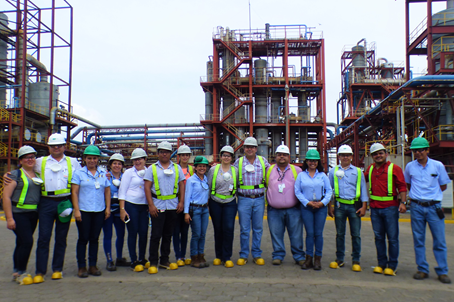
Some of the participants from Mexico, Belize, Guatemala, El Salvador, Honduras and Nicaragua visit the distillery at SER San Antonio mill.
SHARING TOOLS AND IMPLEMENTING BEST PRACTICES
The goal of PanAmericaña’s first regional exchange was to help accelerate the uptake of best practices with the experience gained by SER San Antonio mill while obtaining Bonsucro certification. The experience offered guidance for the sugarcane industry in Mexico, Central America and the Caribbean.
The inaugural ceremony was attended by Carlos Pellas, CEO of Grupo Pellas (SER San Antonio mill); Mario Amador, president of the National Committee of Sugar Producers of Nicaragua; Michaelyn Baur, regional director for Solidaridad; Carlos García, regional programme manager of PanAmericaña; Simon Usher, CEO of Bonsucro; as well as representatives of sugar mills, private producers of sugarcane, and independent consultants, among other guests.
Exequiel Gonzalez, health promoter, trains field workers in better occupational practices and is in charge of keeping a record of their health while ensuring workers are properly hydrated.
Some of the topics covered included:
-
better practices and monitoring systems aimed to reduce thermal stress risks in sugarcane cutters
-
development of new industrial safety equipment
-
improvement of environmental management plans
Baur explained that among the best practices that stand out in the SER San Antonio mill is the implementation of a “water, rest and shade” programme, which involves the workers in the field. "We think that they are doing very interesting practices that could be easily replicated throughout the region," she said.
In the field, mobile tents have been set up to provide shade for workers. The water, rest and shade protocol establishes periodic breaks at specific time intervals.
TECHNICAL ASSISTANCE THAT GOES FURTHER
PanAmericaña works with an expert staff that provides technical assistance to stakeholders that seek sustainability in the sugar sector, ensuring that sugar production generates value for people, communities, businesses, economies and ecosystems. This learning and exchange programme uses the Bonsucro voluntary sustainability standard as a guide by focusing on issues of sugarcane production in five categories: legal compliance, biodiversity and impacted ecosystems, human rights, production and transformation, and continual improvement. Each category is composed of principles, criteria, indicators and verifiers that allow sugarcane producers, processors and suppliers to improve their operations and lessen environmental and social impacts.
The mill has a biological pest control laboratory where they grow and develop native strains.
THE CHALLENGE
The sugarcane sector provides income and valuable products in almost every economy in Latin America. Over four million people and their families rely directly on the cultivation and milling of sugarcane across the region.
"It makes no sense in the 21st Century to produce sugar in any way, or at the lowest cost, without taking into consideration our work practices and our impact in our resources and communities. This is no longer sustainable. Our labour practices must go far beyond what is required by the labour laws of our countries, and our production processes should be as friendly as possible to the environment," said Pellas, while he was recognized for his leadership in the organization of the event.
During the event, García announced the second PanAmericaña regional exchange will be held in early 2018 at one of partner mills in Mexico. Through these events, PanAmericaña is leading the way to sector-wide transformation for the Latin American sugar industry, while producers are positioning Mesoamerica as the global source for sustainable sugar.
New personal protection equipment used by the workers who handle agrochemicals.
Why does PanAmericaña’s support on certification matter? A month ago in Costa Rica, according to Amador, Coca-Cola announced that as of 2020 it will not buy sugar from any mill that does not have Bonsucro certification. "Buyers are increasingly demanding sugar to be sustainable, that meets quality standards, as well as standards of responsibility with the environment and with the workers,” Coca-Cola announced.
PanAmericaña is positioned to be the link in partnerships between multiple stakeholders, promoting models for business management that integrate environmental and social responsibility actions in a viable way so that producers, workers, industries and the communities around them have a sustainable future.
Learn more about Solidaridad programmes in Central America.
